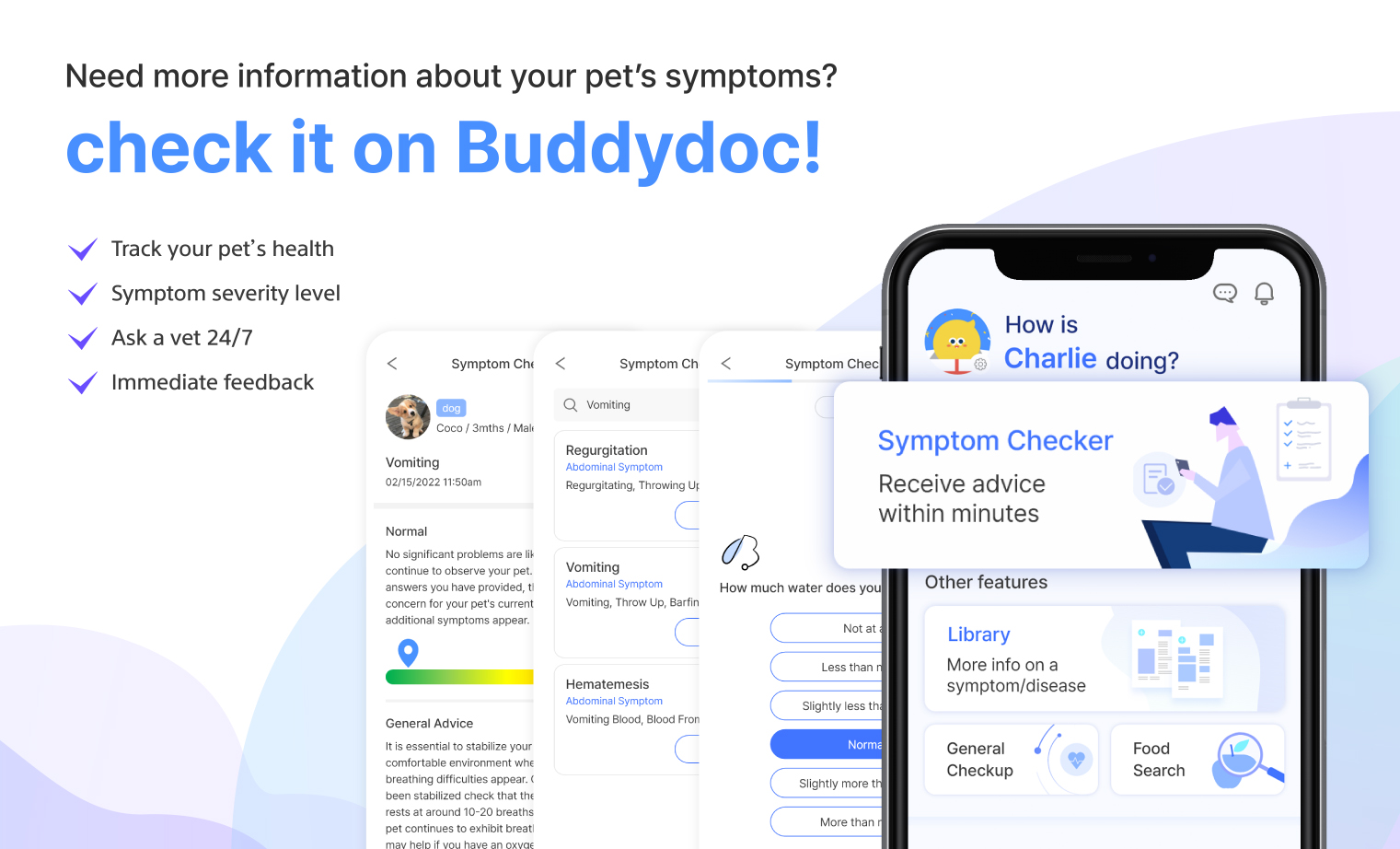SYMPTOMS
Why Is My Dog Gagging and Dry Heaving? Causes and Treatment Options
페이지 정보
본문


What is gagging in dogs?
You may hear a concerning noise from your dog typically at night. Gagging or dry heaving is a normal behavior in dogs that can appear from simply eating too quickly. However, when gagging behavior is recurring or non-stop, this warrants veterinary attention as it can indicate an underlying condition. Nausea symptoms can result from ingesting foreign objects, infectious diseases, or respiratory issues. Understanding the difference between your dog’s coughing, vomiting, and gagging is crucial in helping your veterinarian identify the cause of their behavior. A good practice is to record a video of your dog's behavior to show your veterinarian during a veterinary visit. Continuous coughing/gagging may signal an infection or respiratory problem that can be better assessed with a video.
The difference between coughing, gagging, and vomiting in dogs
Gagging and coughing in dogs are distinct actions that can sound similar but have key differences you should know to distinguish these behaviors. Gagging or dry heaving is characterized by a wide opening of the mouth, creating a retching sound. Gagging behavior is often accompanied by a cough which can be characterized by sudden forceful expulsion of air from the mouth and throat. It is crucial to observe whether your dog coughs and then gags or gags and then coughs, as the order can provide valuable information to veterinarians in diagnosing potential diseases. As for vomiting, dry heaving will mimic vomiting but without any stomach contents coming up except for a small amount of mucus.
Causes of gagging and dry heaving in dogs
If your dog experiences a single episode of dry heaving, it's likely harmless and usually happens to simply clear something from their throat. However, persistent or constant gagging should prompt a thorough examination by your veterinarian to identify the underlying cause. Dogs will dry heave due to various reasons, some considered normal and others life-threatening.
The main causes of gagging and dry heaving are:
-
Ingested foreign matter
When a foreign object is lodged in the throat or esophagus, a dog may gag to clear it out.
-
Kennel cough is an infectious respiratory disease that causes persistent gagging and coughing in dogs.
-
Gastroenteritis
An inflamed gastrointestinal tract can cause gagging symptoms in dogs, particularly noticeable after eating or drinking.
-
Sinusitis and rhinitis
These bacterial infections cause persistent gagging and coughing in dogs while irritating the respiratory tract.
-
Heart disease
Dogs with heart disease can experience symptoms of nausea such as gagging accompanied by short breath, lethargy, and pale blue gums.
-
Tracheal collapse
Problems with the tracheal cartilage can make breathing difficult and cause gagging and coughing symptoms in dogs.
-
Laryngeal paralysis
Dogs with laryngeal paralysis cannot close their larynx well, allowing food and water to pass through causing coughing and gagging symptoms.
-
Parasitic infections
Parasites such as roundworms can move from the intestines to the lungs, causing respiratory symptoms such as coughing and gagging.
Symptoms and signs that can accompany gagging and dry heaving in dogs

The symptoms that accompany gagging in dogs can vary depending on the underlying cause.
Common symptoms that can accompany gagging in dogs include:
- Shortness of breath
- Panting
- Cyanosis – a bluish discoloration of the tongue or mucous membranes
- Fainting
When to see a vet for gagging and dry heaving in dogs
As long as your dog breathes fine and does not exhibit any other abnormal behaviors, a one-time instance of gagging or dry heaving can be considered normal. It is advised to monitor your puppy closely for any signs of new symptoms or recurring gagging behavior. If your dog continues to have gagging issues or is experiencing any other symptoms such as coughing, short breath, difficulty eating, etc. This is enough to indicate a serious underlying condition and you should schedule an appointment for a check-up.
Consult with a veterinarian if you notice any of the following scenarios:
- Gagging and coughing symptoms become more frequent and severe
- Loss of energy and loss of appetite
- Difficulty breathing accompanied by nasal discharge
- Pale-bluish tongue or fainting symptoms
Home treatment options for gagging in dogs
First, check for any foreign objects or signs of choking in your pet. Monitor your pet for the next 24 hours and check if and when your pet gags again. Taking account or recording these episodes can provide your veterinarian with helpful information for diagnosing a potential cause. In the case that gagging occurs due to fast eating, you can divide your pet’s meals into small portions and feed them throughout the day. Providing oxygen at home can also help alleviate symptoms for dogs who experience difficulty breathing or shows signs of cyanosis.
Diagnosing gagging and dry heaving symptoms in dogs

When you visit the animal hospital for your pet’s gagging symptoms, the veterinarian will first try to figure out the exact condition in which your dog exhibits the symptoms through a few questions. It is recommended to try and record an audio or video of your dog showing the symptoms.
The following questions may be asked of you to provide some insight:
- Is your dog’s vaccinations up to date regularly?
- How would you describe the sound your dog makes when gagging?
- Has your dog ever been diagnosed with heart disease?
- Has your dog had any difficulty breathing recently or has cyanosis, a bluish discoloration of the tongue or gums?
According to the answers provided, several tests will be considered for an accurate diagnosis.
The following tests can be performed:
-
Imaging test
A chest radiograph can be used to evaluate the general condition of the respiratory tract and the presence of other diseases.
-
Rhinoscopy
The presence of a foreign body can be checked through a nasal endoscope, and any signs of inflammation in the nasal cavity or esophagus can be evaluated as well.
-
Echocardiogram
Echocardiography is conducted to assess the heart’s functions and structures, confirming heart disease.
-
Stool test
A stool test can check for parasitic infections.
-
PCR test
Swabbing the trachea or larynx to perform a PCR test can help a veterinarian determine which infectious agent is present.
Treatment for gagging in dogs
Treatment for gagging in dogs will vary depending on the underlying cause.
The following treatment options can be considered:
-
Antibiotics
If there is an infection, antibiotics are prescribed.
-
Anti-inflammatory drugs
If the inflammation present is severe, anti-inflammatory drugs are prescribed.
-
Antiparasitics
If a parasitic infection is confirmed, antiparasitics are prescribed.
-
Heart disease medication
If heart disease is confirmed, a variety of medications may be prescribed in combination such as cardiovascular drugs, diuretics, and antihypertensive drugs.
-
Bronchodilators
If tracheal collapse is confirmed, bronchodilators may be prescribed to ease breathing difficulties.
-
Surgery
If there is no significant response to drugs to treat tracheal collapse, surgery to install a stent may be considered.
Preventing gagging and dry heaving symptoms in dogs
To prevent gagging and dry heaving symptoms in dogs, it is a good practice to clean up any small objects that can be accidentally swallowed on higher shelves and storage. Periodic vaccinations can also help prevent conditions that cause gagging symptoms such as parasitic infections and kennel cough. Regular checkups can help detect diseases that can cause gagging symptoms such as heart disease and tracheal collapse through early detection and prompt treatment.
Find out more about your dog’s symptoms and diseases on the Buddydoc app!

The Buddydoc library is filled with everything you’d want to know about each symptom and disease your pet may experience. If you would like to find out more about the causes, signs, treatments, preventions, and more for your dog’s disease. Try out the Buddydoc app and search for your pet’s symptoms or diseases in the Buddydoc library.













